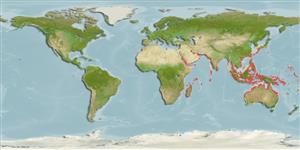Teleostei (teleosts) >
Gobiiformes (Gobies) >
Gobiidae (Gobies) > Gobiinae
Etymology: Bathygobius: Greek, bathys = deep + Latin, gobius = gudgeon (Ref. 45335).
Eponymy: F J Meggitt was a parasitologist at the University College, Rangoon (now in Myanmar), who was a Research Associate of the University of Birmingham. [...] (Ref. 128868), visit book page.
More on authors: Hora & Mukerji.
Environment: milieu / climate zone / depth range / distribution range
Ecology
Marine; brackish; demersal. Tropical
Indo-West Pacific.
Size / Weight / Age
Maturity: Lm ? range ? - 2 cm
Max length : 6.0 cm TL male/unsexed; (Ref. 11441); max. reported age: 3.00 years (Ref. 36558)
Dorsal spines (total): 7; Dorsal soft rays (total): 9; Anal spines: 1; Anal soft rays: 8. Characterized by male with yellowish grey color, densely and diffusely mottled with dusky, bluish whit and dull orange spots; female with dark grey brown color dorsally, paler ventrally, with five large yellowish white blotches dorsally from nape to caudal peduncle; broadly yellow outer part of first dorsal fin in both sexes; upper 5-6 pectoral rays free of membrane; rounded caudal fin; longitudinal scale series 34-40; predorsal scales 14-19, reaching to within half eye diameter of rear edge of eye; cheek and opercle without scales; ctenoid body scales, becoming cycloid on anterior body; depressed head, width greater than depth; depth of body 4.1-4.3 in SL (Ref. 90102).
Inhabits rocky pools of intertidal zone and rocky shores (Ref. 90102). Specimens collected from tide pools of exposed coasts (Ref. 11441). Feeds on planktonic crustaceans, polychaetes and algae (Ref. 36558).
Life cycle and mating behavior
Maturity | Reproduction | Spawning | Eggs | Fecundity | Larvae
Randall, J.E., 1995. Coastal fishes of Oman. University of Hawaii Press, Honolulu, Hawaii. 439 p. (Ref. 11441)
IUCN Red List Status (Ref. 130435: Version 2024-1)
Threat to humans
Harmless
Human uses
Tools
Can't connect to MySQL database fbquizv2. Errorcode: Too many connections
